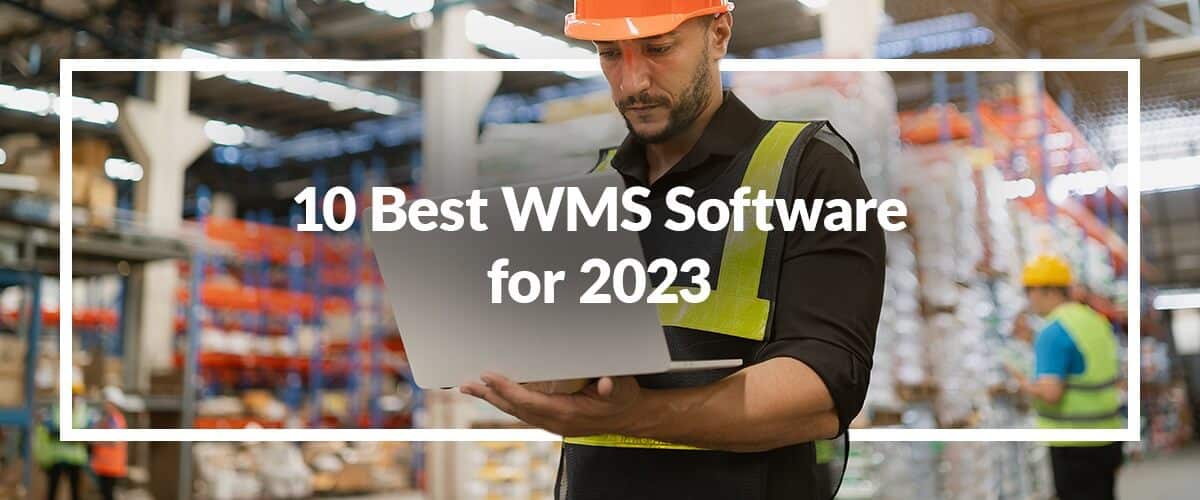Managing modern warehouses is something that can’t be done efficiently without tech-based support. A warehouse management system (WMS) can help.
In this guide, we’ve pulled together some of the best WMS software platforms, including their key features, so you can choose the right software for your warehouse.
Before we dive in, here are the key takeaways you should know about WMS software:
- A WMS is a robust platform used for controlling and optimizing your warehouse process. A WMS can manage and track inventory and coordinate or automate warehouse tasks.
- Integrating a WMS with your warehouse systems will provide real-time visibility of your facility’s processes and goods.
- WMS software has many benefits. For example, a WMS can streamline and automate order processing and fulfillment to speed up deliveries and improve customer satisfaction.
- When evaluating WMS platforms, you should consider each tool’s price, feature set, and user-friendliness to ensure the best fit.
- The Logiwa WMS is often the best option because of its fast and recurring time-to-value, user-friendliness, configurability, and feature-rich functionality.
Contents
What Is WMS Software?
Warehouse management system (WMS) software is a digital tool for controlling and optimizing your warehouse processes. With it, you can manage and track inventory (goods) and coordinate or automate warehouse tasks like order picking, packing, fulfillment, and shipping. It can also provide real-time visibility of everything in your facility, equipping you to make fast and accurate decisions to maintain or boost warehouse productivity.
WMS solutions work by integrating with your warehouse’s existing systems and solutions. These systems may include ERP platforms, accounting and shipping software, and hardware like robotic systems and barcode scanners. The WMS will capture data from connected systems and update you via its dashboard about stock levels, shipping updates, inventory location, and more.
In summary, a WMS solution can integrate your entire warehouse, automate processes, and provide real-time warehouse control and data to enhance your facility’s operations.
The Benefits of WMS Software
Below is a breakdown of the exact benefits you can expect from incorporating a WMS into your facility.
- Improved inventory visibility: The best WMS software provides real-time updates regarding the location and movement of all your inventory. You can use the information to replenish your stock on time, optimize inventory storage, and avoid stockouts or overstocking.
- Enhanced order accuracy: A WMS can automate order picking, packing, and shipping to minimize order fulfillment errors. Automation also speeds up order processing and fulfillment, leading to faster deliveries and improved customer satisfaction.
- Efficient space and labor utilization: A WMS can help you optimize your storage space by storing and organizing inventory more effectively. It can also automate repetitive tasks to lower operating costs and improve labor efficiency.
- Multi-channel integration: You can connect all your warehouse solutions to your WMS to manage orders from various sales channels. The integration also provides end-to-end visibility of everything happening within your facility or with your inventory.
- Data-driven insights: A comprehensive WMS will provide analytics and reports that you can study to make data-driven decisions to enhance service delivery.
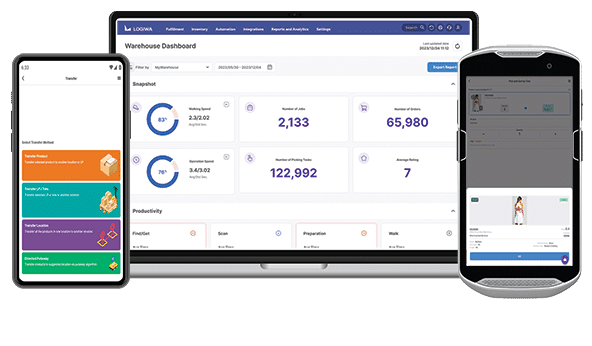
How to Evaluate WMS Software
Several WMS software platforms are available, and the solutions are not equal. Pick the best WMS software for your facility and business goals by considering these factors: price, features, and user-friendliness.
Price
Don’t prioritize choosing the most expensive or affordable WMS software. You may have trouble keeping up with the monthly plans of a too-expensive WMS, and a too-cheap solution may not offer all the features you need. The best WMS software is one that fits your budget and delivers the features required to achieve your warehouse optimization goals.
Features
Every WMS solution has a unique set of features. We recommend selecting comprehensive WMS software with features for seamless warehouse integration, inventory tracking and management, order fulfillment, and reporting and analytics. The software should also be scalable to adapt to your needs as order volumes rise or shrink.
User-Friendliness
The more user-friendly a WMS software is, the sooner you can onboard it to optimize your warehouse and customer experience. A short time to value ensures you can get your return on investing in a WMS within the shortest time.
Best WMS Software Comparison Table
| Key Features | Integrations | Hosting | Use Case | |
| Logiwa | ||||
|
|
|
|
|
| NetSuite WMS | ||||
|
|
|
|
|
| Oracle Fusion Cloud Warehouse Management | ||||
|
|
|
|
|
| SAP Extended Warehouse Management | ||||
|
|
|
|
|
| Fishbowl | ||||
|
|
|
|
|
| ShipHero | ||||
|
|
|
|
|
| Blue Yonder Luminate | ||||
|
|
|
|
|
| SkuVault | ||||
|
|
|
|
|
| Microsoft Dynamics 365 Supply Chain Management | ||||
|
|
|
|
|
| TECSYS Warehouse Management | ||||
|
|
|
|
|
1. Logiwa
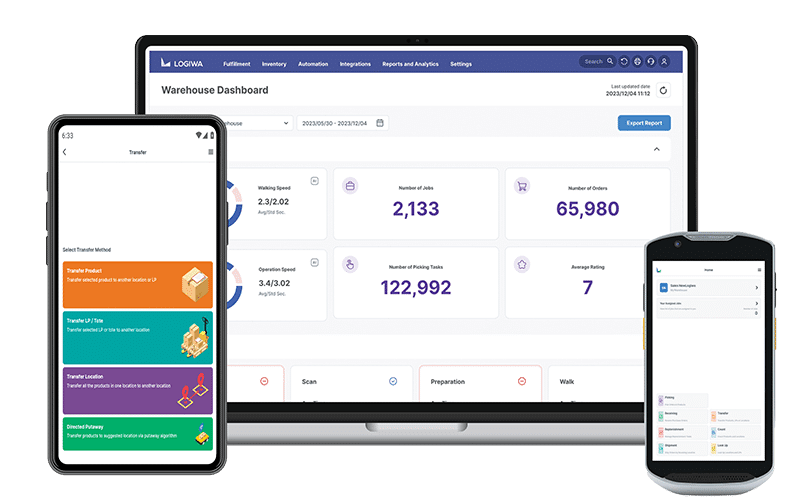
Rating: 4.2/5 (G2)
Key Features:
- Real-time inventory visibility and control
- Complete configurability
- Easy onboarding
- Shipping rate shopping
- Pre-integrated with ecommerce, shipping, accounting, and robotics solutions
- Smart automation
- Scalable and adaptable
- Mobile app
Logiwa WMS is among the best WMS software platforms for warehouses of all sizes, including B2C, 3PL, and DTC facilities Its pre-built integrations simplify connecting it to all your existing warehouse systems to exchange data seamlessly.
You can then view reports and real-time insights generated from the sourced data on your Logiwa dashboard. Alternatively, leverage the data from integrated systems to automate storage, picking, packing, and shipping processes.
The user-friendliness and high configurability of Logiwa WMS simplify onboarding and tailoring it to your warehouse’s unique needs. It also shortens your time to value and helps you save money, as Logiwa charges lower professional service fees to deploy the WMS within your facility.
Logiwa’s AI-enabled tools, such as automated rate shopping and shipping suggestions, save you time and effort. In fact, our customers see a 40% increase in labor efficiency on average. One of our clients currently experiences a time savings of up to three hours per day and a cost savings of $1,200+ per month through simple address verification and shipping box assignment automation rules.
Other reasons to choose Logiwa WMS are its cloud-native design and mobile app for monitoring and controlling your warehouse remotely. Logiwa’s scalability means it can easily adapt to meet your future needs as your business grows and order volumes fluctuate.
2. NetSuite WMS
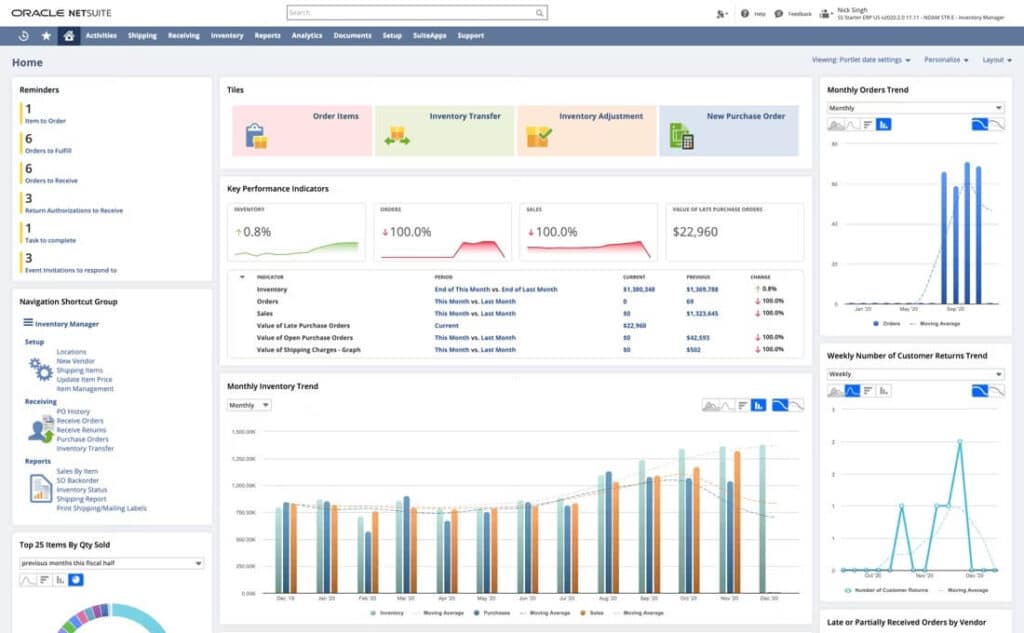
Rating: 4.0/5 (G2)
Key Features:
- Mobile RF barcode scanning
- Putaway and picking automation
- Inventory visibility
- Storage space optimization
The NetSuite WMS offers modern tools to solve age-old warehouse problems. For example, its mobile RF barcode scanner lets workers scan and inventory stock with regular mobile devices.
Changes in inventory information or status will automatically reflect in all warehouse systems integrated with the app. You can also install the WMS to create and execute effective putaway and picking plans and assign tasks to warehouse staff.
The NetSuite WMS allows you to do away with outdated pen-and-paper warehouse management practices. A more modern approach to warehouse management can help you boost productivity, save money, and serve customers better.
As for pricing, NetSuite WMS will cost you an annual licensing fee. You must contact sales for a custom quote.
3. Oracle Fusion Cloud Warehouse Management
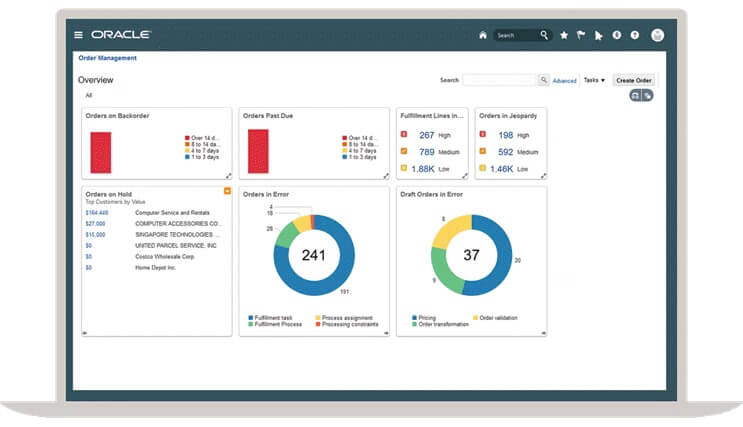
Rating: 3.8/5 (G2)
Key Features:
- Omnichannel fulfillment support
- Inventory operations optimization
- Integration and automation
The Oracle Fusion Cloud Warehouse Management software offers the tools to turn your traditional warehouse into a robust and seamless fulfillment center. It accomplishes this by allowing you to connect and control all your warehouse systems from the Oracle WMS. The connection provides complete visibility into your warehouse from a single system.
Oracle Fusion Cloud Warehouse Management also supports omnichannel fulfillment, meaning you can monitor and control multiple warehouses and sale points with it. Lastly, it’s scalable enough to adapt to meet your warehouse needs as they evolve.
Pricing isn’t available on the website as it’s customized to fit your needs. You must contact sales for more information.
4. SAP Extended Warehouse Management
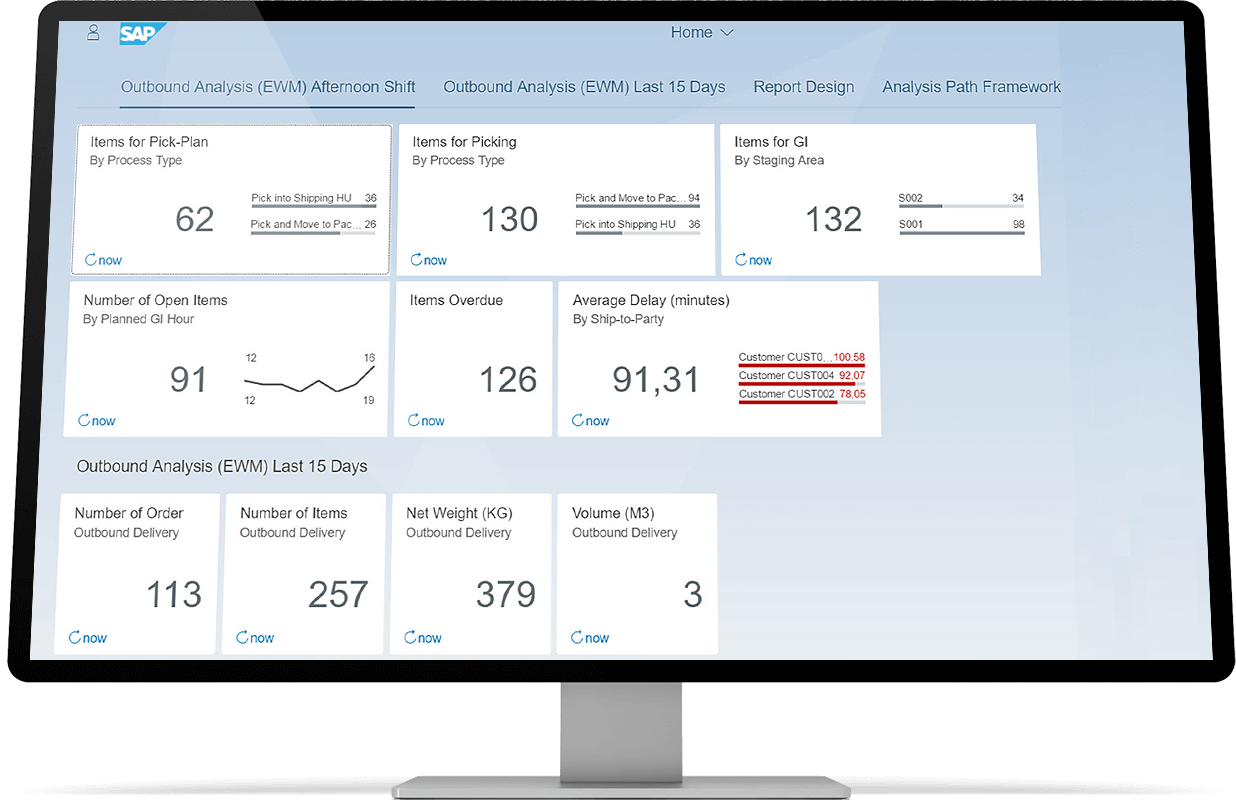
Rating: 4.1/5 (G2)
Key Features:
- On-premise and cloud deployment
- Automation control
- Supply chain management
- Storage and internal process control
If you want to grow from small order volumes to a warehouse that handles higher order volumes, the SAP Extended Warehouse Management software may be for you. You can integrate the software with your warehouse systems to monitor operations and access real-time insights. These insights will help you respond quickly to changing business conditions.
Depending on your preferences, you can use the SAP Extended Warehouse Management software as a cloud-based or on-premise solution. While a cloud-based solution is more scalable, on-premise is ideal if enhanced data security and control are a priority.
Pricing for the SAP Extended Warehouse Management software is only available by request.
5. Fishbowl
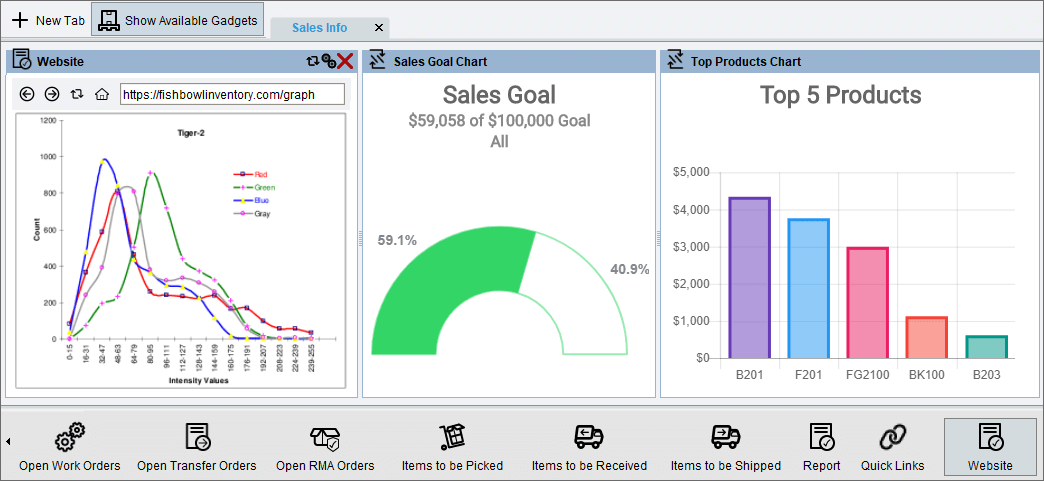
Rating: 4.0/5 (G2)
Key Features:
- Multi-location inventory tracking
- Barcode printing and scanning
- Order fulfillment management
- Picking and packing automation
Fishbowl is one of the best WMS software tools for retailers and ecommerce businesses that want to streamline inventory and warehousing. With Fishbowl, you can maintain accurate inventory counts and manage every warehouse operation. Key features include multi-location management, robust order fulfillment, and many integrations to other warehouse systems.
Fishbowl is available as an on-premise or cloud-based WMS. The cloud-based version of the WMS starts at $349 per month, while the on-premise platform starts at $399 per month.
6. ShipHero
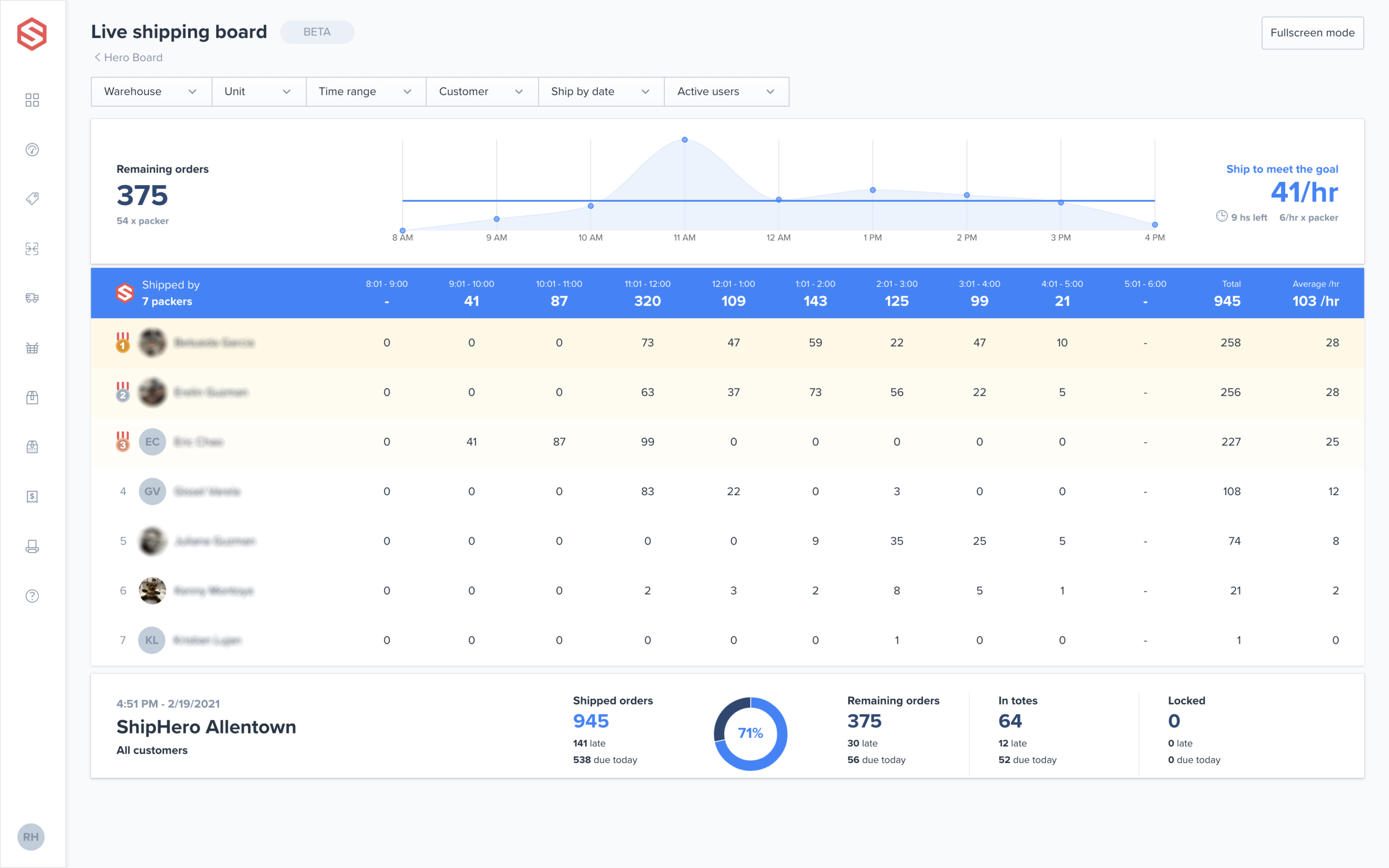
Rating: 4.2/5 (G2)
Key Features:
- One-click integration
- Inventory and order management
- 24/7/365 Support
- Automation rules
The ShipHero WMS is ideal for ecommerce and retail businesses looking to fast-track shipping and optimize inventory control. The software offers several solutions for optimizing picking, packing, and shipping. For example, it can provide a picking plan that helps your pickers pick and pack more in less time.
Besides fast shipping, ShipHero can help you save money by comparing shipping rates from logistics companies and picking the most wallet-friendly. Pricing plans for ShipHero start at $1,995 per month. If you’re a 3PL, pricing starts at $2,145 per month.
7. Blue Yonder Luminate
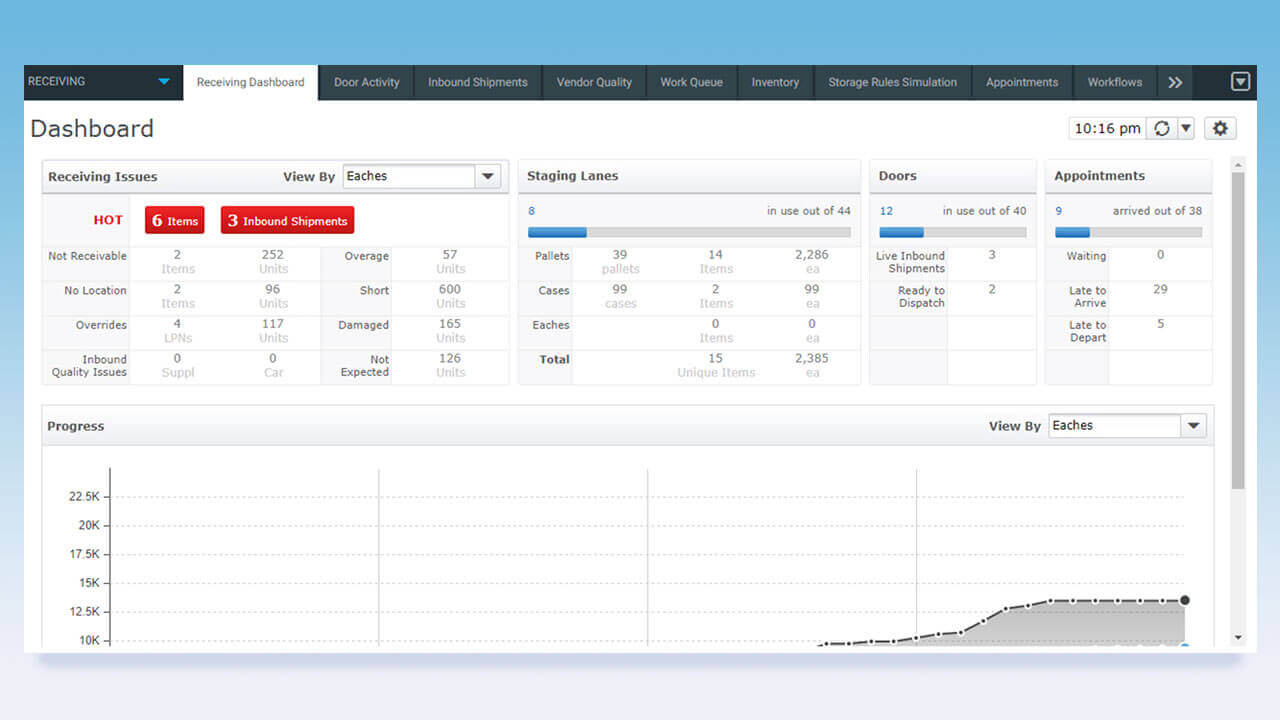
Rating: 4.1/5 (G2)
Key Features:
- Intuitive and configurable UI
- Real-time inbound and outbound processing
- Unified inventory and warehouse visibility
- Intelligent inventory management
Blue Yonder Luminate is a great solution for optimizing your warehouse’s customer service. It achieves this by reducing your order fulfillment time through automation and picking optimization.
Another reason this WMS software made our list is its end-to-end control and visibility to improve inventory management. With proper execution, you can significantly reduce operational costs and increase warehouse productivity with Blue Yonder.
Blue Yonder’s pricing isn’t available on its website. You must contact sales for more information.
8. SkuVault
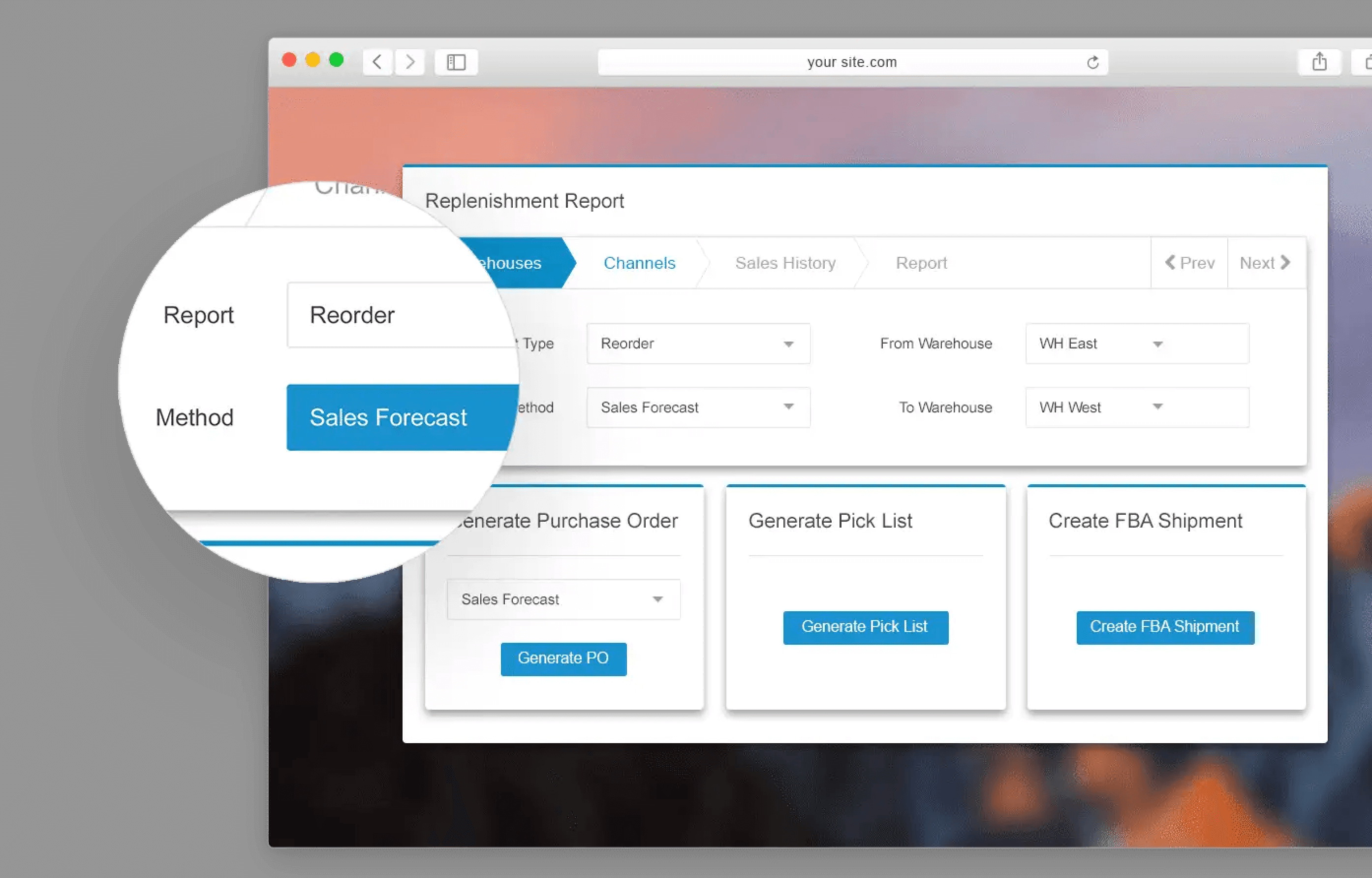
Rating: 3.7/5 (G2)
Key Features:
- Amazon FBA integration
- Inventory management and reporting
- Pick, pack, and shipping automation
Scale your ecommerce business to handle more orders with SkuVault. The WMS software is suitable for retailers of all sizes that want to automate inventory tracking, picking, and packing.
SkuVault’s digital picking feature (Hyper Picking) is especially useful because it reduces human error and increases picking speeds. You can access SkuVault for $449 per month if you process 2,000 orders or less. Pricing plans increase from there, depending on the number of orders you complete each month.
9. Microsoft Dynamics 365 Supply Chain Management
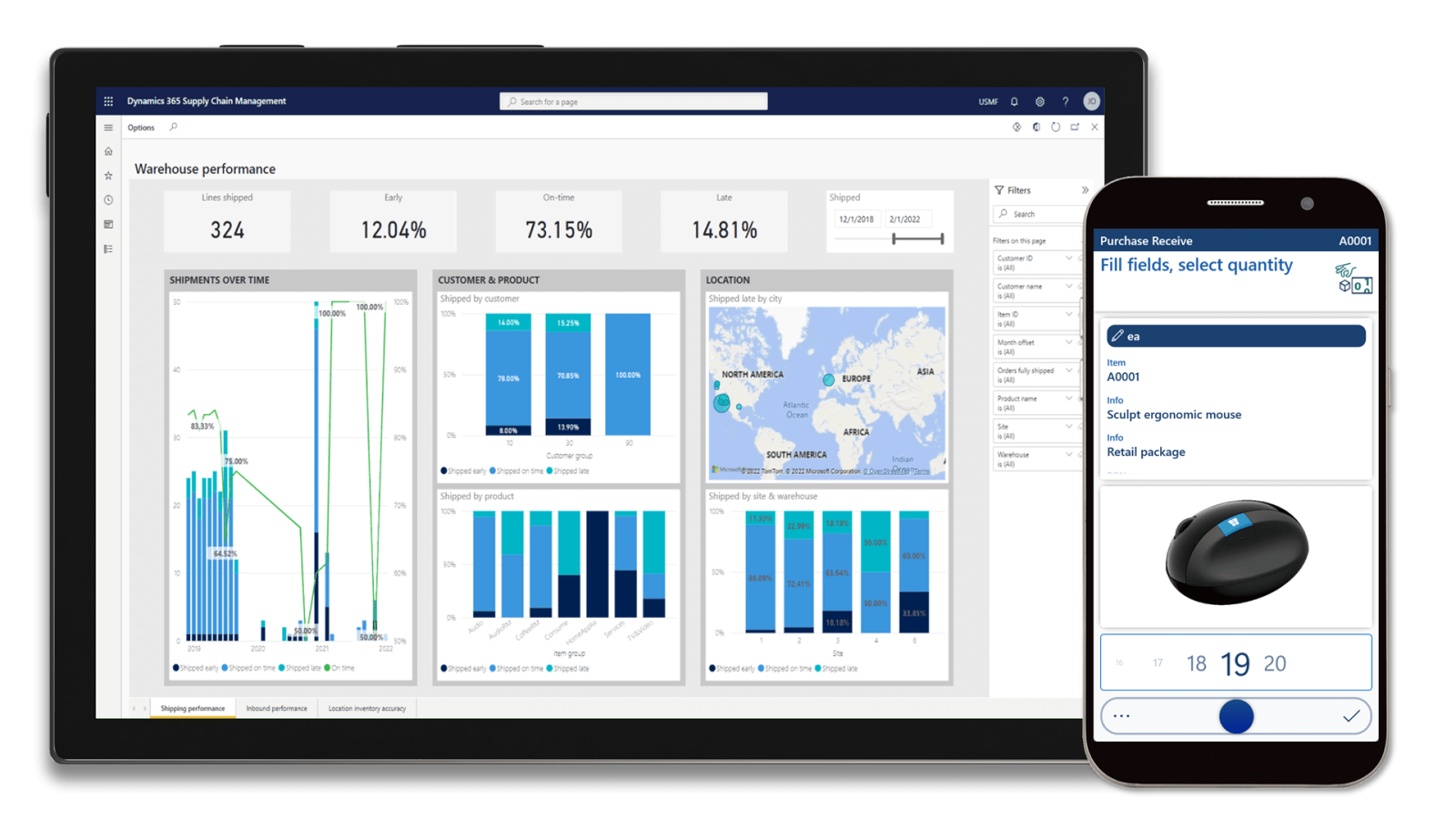
Rating: 3.7/5 (G2)
Key Features:
- Inventory planning and forecasting
- Order management and pricing
- Warehouse fulfillment automation
- Android, iOS, and Windows app
Microsoft Dynamics 365 Supply Chain Management is a complete warehouse management solution for organizations in various industries, including retail and manufacturing. The platform’s forecasting tool helps accurately predict demand levels, so you can stock up your warehouse in preparation. Proactively replenishing stock will help prevent costly stockouts or overstocking.
The software’s versatility ensures you can adapt it to meet your warehouse’s needs as they evolve. Also, if you pay for the Dynamics 365 Intelligent Order Management tool, you can centrally manage and track all orders with the help of AI. Pricing for Microsoft Dynamics 365 SCM starts at $180 per user/month.
10. TECSYS Warehouse Management
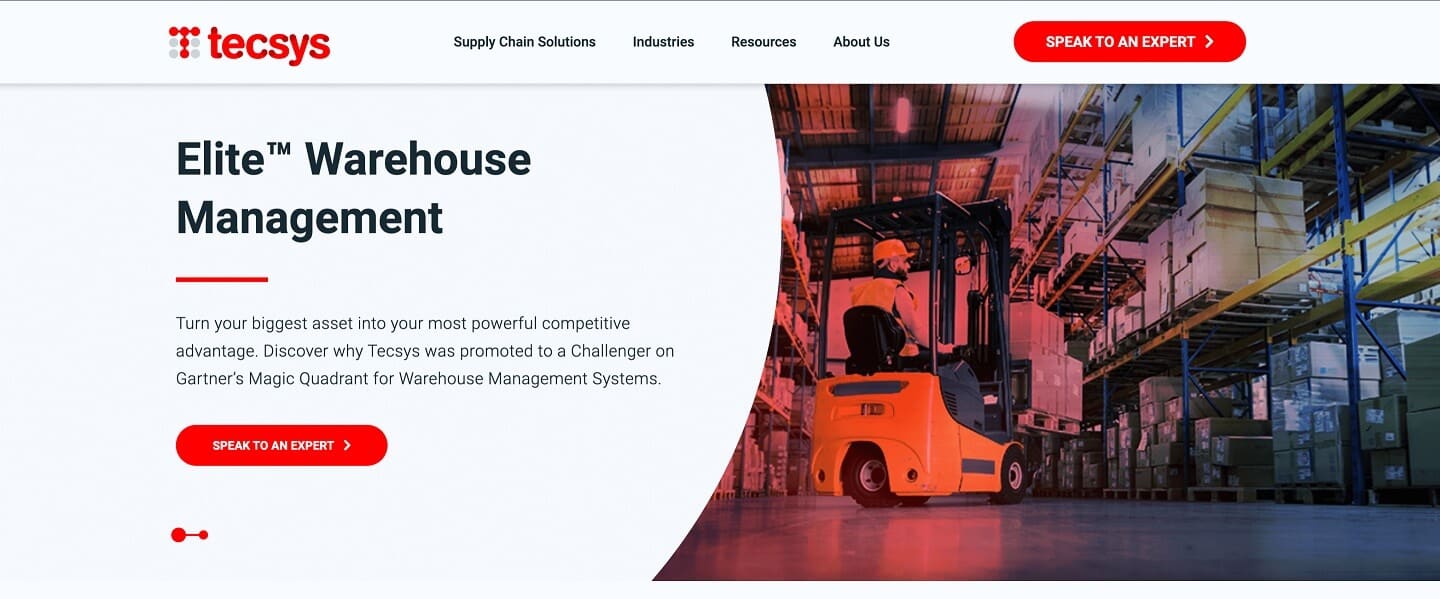
Rating: 4.5/5 (G2)
Key Features:
- Inventory management and visibility
- Flexible workflows
- Intuitive and easy-to-use technology
- Visual logistics
The TECSYS WMS equips warehouse teams to fulfill more orders and generate more revenue. For example, the software’s Visual Logistics tools allow you to give workers clear visual instructions to pick and pack. The clarity of instructions minimizes order fulfillment errors, contributing to increased warehouse efficiency and productivity.
The WMS can scale and adapt to match your warehouse needs as your customer base and order volume fluctuate. The advanced features also future-proof your organization, so you can stay competitive as the logistics industry evolves. Lastly, the warehouse management software’s configurability and intuitive interface simplify onboarding and tailoring the solution to your needs.
For pricing information, you must contact the TECSYS sales team.
Streamline Warehouse Operations with Logiwa
The many ways a WMS can help you improve inventory management, warehouse monitoring, and order fulfillment are indisputable. However, you’ll only experience these benefits if your WMS has the features you need to optimize your warehouse operations.
Compared to other WMS software contenders, Logiwa stands out as more scalable, versatile, and user-friendly. These features mean you can use Logiwa to your advantage, regardless of your industry or warehouse size. Also, Logiwa offers everything you need to automate and optimize your warehouse operations to cut costs, boost revenue, and secure customer satisfaction.
Don’t just take our word for it. Request a free demo today to experience the many benefits of Logiwa for yourself.
WMS Software FAQs
Q: How can the best WMS software impact customer satisfaction?
A: The best WMS software can streamline and automate order processing and fulfillment, leading to faster deliveries, reduced errors, and ultimately, improved customer satisfaction.
Q: What is the best WMS software available in the market?
A: The best WMS (Warehouse Management System) software varies based on individual business needs, but popular options include Logiwa WMS, SAP EWM, Oracle WMS, and Manhattan Associates. It’s essential to assess features, scalability, and pricing to determine the best fit for your organization.
Q: Why is it important to choose the best WMS software for your business?
A: Choosing the best WMS software ensures efficient inventory management, accurate order fulfillment, and streamlined warehouse operations. It can lead to reduced operational costs, improved customer satisfaction, and increased profitability.
Q: How do I determine which WMS software is the best for my company?
A: To determine the best WMS software for your company, consider factors like your business size, industry-specific needs, integration capabilities, user-friendliness, scalability, time to implement, and budget. It’s also beneficial to request demos and read user reviews.
Q: Are there free versions of the best WMS software?
A: While many top-tier WMS solutions come with a cost, there are free or open-source WMS software options available. However, they might lack some advanced features or scalability offered by premium solutions.
Q: How does the best WMS software improve warehouse efficiency?
A: The best WMS software offers real-time inventory tracking, optimizes picking and packing processes, reduces human errors, and provides data analytics for better decision-making. All these features contribute to improved warehouse efficiency.
Q: Can the best WMS software integrate with other business systems?
A: Yes, most of the best WMS software solutions offer integration capabilities with ERP (Enterprise Resource Planning), e-commerce platforms, and other business systems to ensure seamless data flow and enhanced operational efficiency.
Q: Is training required to use the best WMS software?
A: While the best WMS software is designed to be user-friendly, training is often recommended to ensure all users can maximize the system’s capabilities and features. Many WMS providers offer training sessions and support to assist users.
Run a digital fulfillment experience with a fully integrated Cloud WMS Software
Warehouse Management
Modern digital WMS powers a modern fulfillment experience

